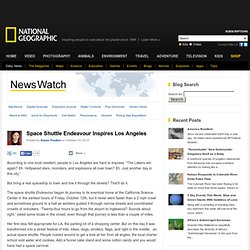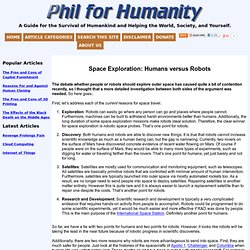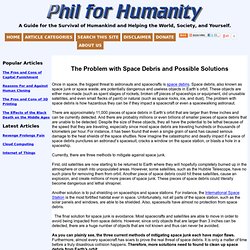

Astronomy For Kids - KidsAstronomy.com. In Your Life. NASA science in your Home and City. Space Shuttle Endeavour Inspires Los Angeles. According to one local resident, people in Los Angeles are hard to impress.

“The Lakers win again? Eh. Hollywood stars, monsters, and explosions all over town? Eh. Just another day in this city.” But bring a real spaceship to town and tow it through the streets? The space shuttle Endeavour began its journey to its eventual home at the California Science Center in the earliest hours of Friday, October 12th, but it never went faster than a 2 mph crawl and sometimes ground to a halt as workers guided it through narrow streets and coordinated crowds of onlookers.
Her first stop felt appropriate for LA, the parking lot of a shopping center. The shuttle rests in a local Los Angeles shopping center parking lot. That afternoon I walked down Manchester Avenue chatting with local residents as the shuttle approached its first major stop in front of Randy’s Donuts, a Los Angeles icon. Crowds gather on the side of the 405 freeway in downtown Los Angeles to catch a glimpse of the shuttle. Why We Explore. Celestia: Home.
Space Exploration: Humans versus Robots. The debate whether people or robots should explore outer space has caused quite a bit of contention recently, so I thought that a more detailed investigation between both sides of the argument was needed.

So here goes.. First, let’s address each of the current reasons for space travel. Exploration: Robots can easily go where any person can go and places where people cannot. Furthermore, machines can be built to withstand harsh environments better than humans. Additionally, the long duration of some space exploration missions make robots ideal solution. Additionally, there are two more reasons why robots are more advantageous to send into space.
Another reason why sending robots into space is better is because of cost. As mentioned before, the biggest advantage that people have over robots is their flexibility of tasks that they can perform and their ability to reason to solve whatever problems that may arise. A Better Purpose for NASA. Space Exploration: Government versus Big Business. To this day, I am still surprised that there is a debate if space exploration should migrate from government programs to corporations.

For a long time, companies have been successfully launching unmanned satellites into orbit. These companies even do this as safely as government programs and for a profit too. Previously, governments had a monopoly on this business; and now, companies are driving down these costs for consumers. So this leads to the question as to why governments should be the sole benefactors of their space programs?
Having businesses compete improves the options and innovativeness, while at the same time decreases the cost for consumers. Currently, some governments are selling tickets for tourism into space. On the other hand, what governments should continue doing are space missions that are not profitable, such as the scientific research and space exploration, since businesses are not interested in non-profitable endeavors.
The Problem with Space Debris and Possible Solutions. Once in space, the biggest threat to astronauts and spacecrafts is space debris.

Space debris, also known as space junk or space waste, are potentially dangerous and useless objects in Earth’s orbit. These objects are either man-made (such as spent stages of rockets, broken off pieces of spaceships or equipment, old unusable satellites, and even small flecks of paint) or natural (such as space rocks, ice, and dust). The problem with space debris is how hazardous they can be if they impact a spacecraft or even a spacewalking astronaut. There are approximately 11,000 pieces of space debris in Earth’s orbit that are larger than three inches and can be currently detected.
And there are probably millions or even billions of smaller pieces of space debris that are unable to be detected. Currently, there are three methods to mitigate against space junk. Another solution is to put shielding on spaceships and space stations. The final solution for space junk is avoidance. The Value of Space Exploration. Take part & help - World Wide Astronomy Efforts. Future Space Technologies. Space Elevator. Missions. Galaxy Colonization. Benefits of Space Exploration.